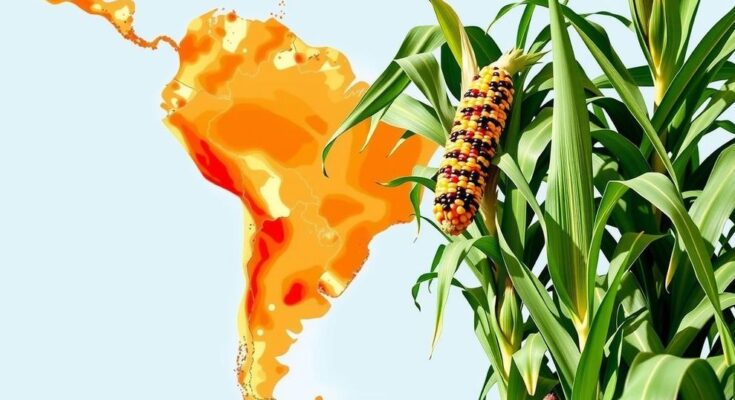Argentina’s dry weather has spurred fears about crop yields, causing a rise in soybean and corn futures. Soybeans increased by 1.29% to $10.04 per bushel, while corn rose by 0.78% to $4.54 per bushel. Wheat futures also edged up, and Kazakhstan ramped up grain exports, amid growing discontent among French farmers over competition and policy issues.
The recent dry weather conditions in Argentina have raised concerns about crop yields, significantly impacting soybean and corn prices in the futures market. On the Chicago Board of Trade (CBOT), soybean futures surged by 1.29% to reach $10.04 per bushel, while corn prices increased by 0.78%, settling at $4.54 per bushel. Although recent rainfall had provided some relief, the hot, arid climate continues to threaten the upcoming 2024/25 crop season. Furthermore, wheat futures saw a slight rise of 0.8% to $5.33 per bushel, driven by global weather-induced supply challenges. In contrast, Kazakhstan capitalized on these developments by exporting 3.7 million metric tons of grain from September to December, marking a 54% increase compared to the previous year. However, this windfall contrasts sharply with the discontent among French farmers who have protested against perceived inequities stemming from competitive pressures and governmental policies.
The article discusses the influence of climate conditions on agricultural markets, particularly focusing on the grain markets in the context of current events in Argentina and Kazakhstan. Argentina is experiencing dry weather that threatens its agricultural output, instigating fears about reduced crop yields. This situation is reflective of broader climate challenges affecting agricultural productivity globally, necessitating adaptation in trade practices and economic strategies. Furthermore, the actions of Kazakhstan to enhance its grain exports amidst such adversity provide insight into how nations may respond differently to similar challenges.
In summary, the ongoing dry weather in Argentina has intensified concerns over grain supply, leading to a rise in soybean and corn futures. Kazakhstan’s increased grain exports highlight a shifting dynamic in global agricultural markets, while protests among European farmers underscore the complexities within the agricultural sector. These developments illustrate how climate change continues to reshape not only agricultural practices but also international trade relations.
Original Source: finimize.com




